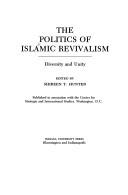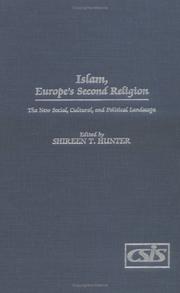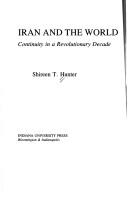| Listing 1 - 10 of 17 | << page >> |
Sort by
|

ISBN: 0253204666 0253345499 Year: 1988 Publisher: Bloomington, Ind. Indiana University Press
Abstract | Keywords | Export | Availability | Bookmark
 Loading...
Loading...Choose an application
- Reference Manager
- EndNote
- RefWorks (Direct export to RefWorks)
Sociology of religion --- Islam --- Internal politics --- Islam and politics. --- Islam et politique --- Histoire --- Islamic countries --- Pays musulmans --- Politics and government. --- Politique et gouvernement --- -Islam and politics --- Politics and Islam --- Political science --- Mohammedanism --- Muhammadanism --- Muslimism --- Mussulmanism --- Religions --- Muslims --- Political aspects --- -Muslim countries --- Politics and government --- -Politics and government --- Islam and politics
Book
ISBN: 9290791934 9789290791935 Year: 1995 Volume: 63 Publisher: Brussels: Centre for European policy studies,
Abstract | Keywords | Export | Availability | Bookmark
 Loading...
Loading...Choose an application
- Reference Manager
- EndNote
- RefWorks (Direct export to RefWorks)
This short, thoughtful essay argues that Turkey is at a crossroads in terms of its foreign policy and basic orientation as a state. The long hegemony of Kemalism, the doctrine derived from the views of modern Turkey's founder, Mustafa Kemal Ataturk, is nearly over. Turkey is no longer as secular or statist as it once was. Islamic movements are now surprisingly strong, although Hunter does not believe that the army will allow them to come to power. The Kurdish crisis has cost Turkey dearly, not only in financial terms but also in terms of its standing as a democratic country respectful of human rights. If Turkey is to have a European future - which seems not at all certain at this point - it will have to find a way to end this debilitating conflict and accept a degree of pluralism that Ataturk tried unsuccessfully to suppress. This short study does a fine job of highlighting the choices confronting Turkish leaders. (William B. Quandt)
Turkey --- Turquie --- Politics and government --- Economic conditions --- Foreign relations --- Politique et gouvernement --- Conditions économiques --- Relations extérieures --- TurquiePolitics and government --- Conditions économiques --- Relations extérieures

ISBN: 0275976084 0275976092 9780275976095 Year: 2002 Publisher: Westport, Conn.: Praeger,
Abstract | Keywords | Export | Availability | Bookmark
 Loading...
Loading...Choose an application
- Reference Manager
- EndNote
- RefWorks (Direct export to RefWorks)
Muslims --- Islam --- Multiculturalism --- Musulmans --- Multiculturalisme --- Cultural assimilation --- Acculturation --- Europe --- Ethnic relations. --- Relations interethniques --- -Islam --- -Muslims --- -Multiculturalism --- -#SBIB:032.IO --- #SBIB:316.331H300 --- #SBIB:328H210 --- Cultural diversity policy --- Cultural pluralism --- Cultural pluralism policy --- Ethnic diversity policy --- Social policy --- Anti-racism --- Ethnicity --- Cultural fusion --- Mohammedans --- Moors (People) --- Moslems --- Muhammadans --- Musalmans --- Mussalmans --- Mussulmans --- Mussulmen --- Religious adherents --- Mohammedanism --- Muhammadanism --- Muslimism --- Mussulmanism --- Religions --- -Godsdienst en samenleving: algemeen --- Instellingen en beleid: West-Europa: comparatief / diverse landen --- Government policy --- #SBIB:032.IO --- Godsdienst en samenleving: algemeen --- Muslims - Europe --- Islam - Europe --- Muslims - Cultural assimilation - Europe --- Multiculturalism - Europe --- Europe - Ethnic relations --- culture --- politics --- the social landscape --- the Islamic world --- Christianity
Book
ISBN: 9290792019 Year: 1996 Publisher: Brussels : Centre for European policy studies,
Abstract | Keywords | Export | Availability | Bookmark
 Loading...
Loading...Choose an application
- Reference Manager
- EndNote
- RefWorks (Direct export to RefWorks)
Book
ISBN: 9290791853 9789290791850 Volume: 61 Publisher: Brussels: Centre for European policy studies,
Abstract | Keywords | Export | Availability | Bookmark
 Loading...
Loading...Choose an application
- Reference Manager
- EndNote
- RefWorks (Direct export to RefWorks)
Following the disintegration of the Soviet Union in December 1991, the three Transcaucasian states of Armenia, Azerbaijan and Georgia became independent after nearly two centuries of Tsarist and Soviet imperial rule. Rather than ushering in a period of economic reconstruction and social and political democratisation, however, official independence has plunged the region into internal turmoil. The Transcaucasus has also been the scene of fierce rivalries among regional and international actors seeking economic advantages and political influence. The main contender for regional supremacy has been Russia, which continues to view these countries as vital to its own security and within the purview of its special zone of influence. The West too attaches considerable strategic and economic significiance to the region, as a consequence of its vast oil and gas reserves and its proximity to the Persian Gulf and the Middle East, to Turkey and the Black Sea region and to Central Asia. Turkey and Iran have also been deeply engaged in the game of influence in the Transcaucasus. In this monograph, Shireen T. Hunter traces the evolution of events in the Transcaucasus since early 1987, and analyses the principal factors that have determined the direction of developments in the region. In order to make better sense of recent events, she also provides an historical and cultural overview of the region and discusses their current relevance. The process of transition in these countries is not over yet and, in Ms. Hunter's assessment, most of the recent changes are far from irreversible. She argues that the West still has the time and the ability to reassess its past policies and revise them in a way so as to secure its principal objectives and correct some of its past mistakes.
Caucasus, South --- Transcaucasie --- Politics and government --- Ethnic relations --- Politique et gouvernement --- Relations interethniques --- Commonwealth of Independent States
Book
ISBN: 1315701235 131746124X 1282119648 9786612119644 1780345860 0765623242 9780765623249 9781780345864 9781282119642 6612119640 9780765622389 0765622386 9780765622396 0765622394 9781317461241 1317461231 Year: 2015 Publisher: Armonk (N.Y.): Routledge,
Abstract | Keywords | Export | Availability | Bookmark
 Loading...
Loading...Choose an application
- Reference Manager
- EndNote
- RefWorks (Direct export to RefWorks)
This compelling volume introduces the current generation of moderate reformist thinkers and activists within Islam, the intellectual traditions they carry on, and the reasons why reformist movements have been overshadowed by fundamentalist, revolutionary, and jihadist movements in the Islamic world today.
Islam --- Islamic renewal --- Globalization --- Religious awakening --- Islamic modernism. --- Modernism, Islamic --- Islamic reform --- Islamic revivalism --- Islamic revivalist movement --- Ṣaḥwah (Islam) --- Wahhābīyah --- Religious aspects --- Islam. --- Reform --- Renewal --- Islam - 21st century --- Islamic renewal - Islamic countries --- Globalization - Religious aspects - Islam --- Religious awakening - Islam --- Islamic modernism
Book
ISBN: 031338195X 0313381941 9780313381959 9780313381942 Year: 2010 Publisher: Santa Barbara (Calif.): Praeger,
Abstract | Keywords | Export | Availability | Bookmark
 Loading...
Loading...Choose an application
- Reference Manager
- EndNote
- RefWorks (Direct export to RefWorks)
"Iran's Foreign Policy in the Post-Soviet Era: Resisting the New International Order" provides the first truly comprehensive, in-depth survey of Iranian foreign policy, issue by issue and country by country, since the Islamic Revolution. To help readers understand both the what and the why of Iran's role in the world and formulate useful responses to that role, the author provides a detailed analysis of Iranian foreign policy in all its dimensions. The first part of the book places Iranian actions, particularly its relations with the United States and other key players, within the context of the emerging international system, while also showing how domestic developments impact foreign policy. The second part surveys Iranian relations with specific actors, notably the United States and Russia, and with key regions, including Europe, Central Asia, the Arab world, Latin America, and Africa. Providing an antidote to existing preconceptions, this incisive analysis lays an analytically sound basis for shaping policies toward Iran-policies with potentially high payoff in terms of regional security and stability.

ISBN: 0253328772 Year: 1990 Publisher: Bloomington Indiana University Press
Abstract | Keywords | Export | Availability | Bookmark
 Loading...
Loading...Choose an application
- Reference Manager
- EndNote
- RefWorks (Direct export to RefWorks)
Book
ISBN: 1498564976 9781498564977 9781498564960 1498564968 9781498564977 Year: 2017 Publisher: Lanham, MD : Lexington Books,
Abstract | Keywords | Export | Availability | Bookmark
 Loading...
Loading...Choose an application
- Reference Manager
- EndNote
- RefWorks (Direct export to RefWorks)
Geopolitics --- New democracies --- Since 1991 --- Caucasus, South --- Georgia (Republic) --- Armenia --- Azerbaijan --- Strategic aspects. --- Politics and government.
Book
ISBN: 9781442272576 1442272570 9781442272583 1442272589 9781442272590 Year: 2017 Publisher: Lanham Rowman & Littlefield
Abstract | Keywords | Export | Availability | Bookmark
 Loading...
Loading...Choose an application
- Reference Manager
- EndNote
- RefWorks (Direct export to RefWorks)
This timely book offers an accessible introduction to religion in international affairs. Shireen T. Hunter highlights the growing importance of religion in politics and analyzes its nature, role, and significance. She places the question of religion's impact on global affairs in the broader context of state and nonstate actors, weighing the factors that most affect their actions. Through the lens of three compelling and distinctive case studies--Russia's response to the Yugoslav crisis, Turkey's reaction to the Bosnian war, and Europe's policy toward Turkish membership in the EU--Hunter demonstrates that religion increasingly shapes international affairs in significant and diverse ways. Her book is essential reading for anyone needing a better understanding of why and, more important, how, religion influences the behavior of international actors and thus the character of world politics. --
Religion and international relations --- Religion and politics --- Religion and state
| Listing 1 - 10 of 17 | << page >> |
Sort by
|

 Search
Search Feedback
Feedback About UniCat
About UniCat  Help
Help News
News